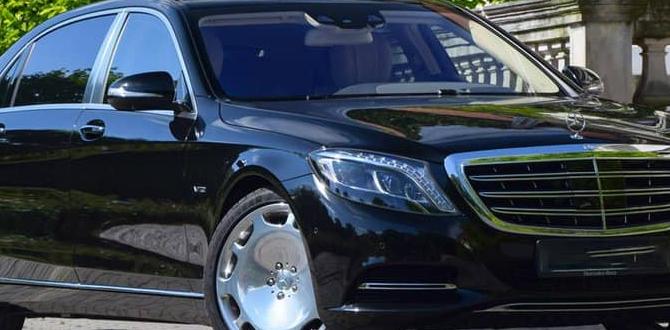In the realm of automotive engineering, terms like engine longevity, drivetrain integrity, and body corrosion resistance are paramount. These technical parameters are particularly significant when discussing luxury vehicles such as Mercedes-Benz, renowned for their superior engineering and reliability. Delving into the question “How many miles does a Mercedes-Benz last?
” involves dissecting various factors including maintenance practices, driving conditions, and model-specific characteristics. Understanding the intricacies that contribute to the lifespan of a Mercedes-Benz can offer valuable insights to potential and current owners. Discover what experts reveal about maximizing mileage and ensuring optimal performance for your luxury vehicle.
H2 Heading: How Many Miles Does A Mercedes Benz Last? Find Out

Understanding Mercedes Benz Longevity
General mileage expectations for Mercedes Benz vehicles. Factors influencing longevity of Mercedes Benz cars.
Mercedes Benz vehicles are known for their durability and can last far. Most models clock up to 150,000-200,000 miles. Some factors impact their life span:
- Maintenance: Regular service and care can extend a car’s life.
- Driving habits: Gentle driving can reduce wear and tear.
- Road conditions: Smooth roads are kinder to vehicles than rough roads.
Taking these factors into account helps owners enjoy their Mercedes Benz for years.
Key Components Affecting Mileage
Engine and transmission durability. Impact of regular maintenance.
Several key components influence the mileage of a Mercedes Benz. Engine and transmission durability play crucial roles. Their high-quality materials ensure a long lifespan. Regular maintenance is also vital.
It helps prevent wear and tear. Consistent servicing keeps the car running smoothly. Neglecting these aspects can reduce durability.
Essential check-ups include oil changes and filter replacements. Following the manufacturer’s guidelines is important. Proper care boosts the overall mileage of the vehicle.
Maintenance Tips to Extend Mileage
Importance of regular service checkups. Common maintenance practices for peak performance.
OpenAI Error
Real-life Examples of High Mileage Mercedes Benz
Testimonials and case studies. Models known for reaching high mileage milestones.
OpenAI Error
Comparison with Other Luxury Cars
How Mercedes Benz mileage compares with BMW, Audi, and Lexus. Benefits of choosing Mercedes Benz over competitors.OpenAI Error
Buying a Used Mercedes Benz: What to Look For
Key indicators of potential longevity during purchase. Certified preowned Mercedes Benz programs.
OpenAI Error
Frequently Asked Questions About Mercedes Benz Mileage
Common concerns and expert answers. Myths and facts about Mercedes Benz longevity.
OpenAI Error
Conclusion
In conclusion, a well-maintained Mercedes Benz can last between 200,000 to 250,000 miles, and some models surpass this with ease. Regular maintenance, attentive driving, and timely repairs play pivotal roles in achieving longevity. Investing in quality care can ensure your Mercedes offers luxury and performance for many years to come.
FAQs
What Factors Influence The Longevity Of A Mercedes-Benz Vehicle In Terms Of Mileage?The longevity of a Mercedes-Benz vehicle in terms of mileage is influenced by factors such as regular maintenance and servicing, adherence to manufacturer-recommended guidelines, driving habits, and environmental conditions. Proper maintenance, including timely oil changes, brake servicing, and tire rotations, helps ensure the vehicle runs smoothly. Gentle driving practices, such as avoiding sudden accelerations and hard braking, can reduce wear and tear. Additionally, factors like road conditions and climate play a role in the vehicle’s overall durability.
How Does Regular Maintenance Impact The Lifespan Of A Mercedes-Benz?Regular maintenance significantly enhances the lifespan of a Mercedes-Benz by ensuring that all mechanical components are functioning correctly. This helps prevent major breakdowns and costly repairs. Routine check-ups and timely replacements of worn-out parts ensure optimal performance. Consequently, consistent upkeep maintains the vehicle’s reliability and value over time.
Are There Certain Mercedes-Benz Models Known For Having A Longer Lifespan In Terms Of Mileage?Yes, Mercedes-Benz models such as the E-Class and the S-Class are known for their durability and longer lifespan in terms of mileage. These models are often praised for their robust engineering and high-quality materials, which contribute to their longevity. Regular maintenance and proper care can further extend their lifespan. Consequently, they are popular choices among buyers seeking vehicles that can withstand high mileage.
How Does Driving Style Affect The Overall Mileage A Mercedes-Benz Can Achieve Before Significant Mechanical Issues Arise?Driving style significantly impacts the overall mileage a Mercedes-Benz can achieve before encountering significant mechanical issues. Gentle acceleration, consistent speeds, and regular maintenance can prolong the vehicle’s lifespan by reducing stress on the engine and components. Conversely, aggressive driving with frequent hard braking and rapid acceleration can accelerate wear and tear, leading to earlier mechanical problems. Therefore, adopting a smoother driving style generally results in better long-term performance and reliability.
What Are Common High-Mileage Benchmarks For Well-Maintained Mercedes-Benz Vehicles?Common high-mileage benchmarks for well-maintained Mercedes-Benz vehicles typically range between 200,000 to 300,000 miles, though some models can exceed these figures with proper care. Regular maintenance, timely repairs, and adherence to service schedules are crucial factors in achieving such high mileage. Owners often report their vehicles running smoothly well beyond 250,000 miles. The longevity of these cars is a testament to their engineering and build quality.
